#Jaggery
Explore tagged Tumblr posts
Text
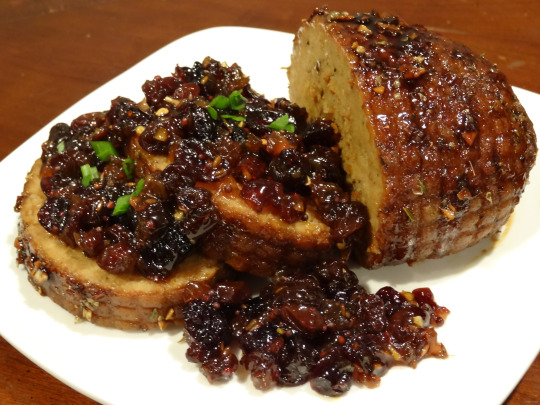
Cranberry chutney
Sweet, tart, jammy cranberries evolve into the subtle aromatics of cumin, mustard, and bay leaf before rounding off into a smooth, even chili heat in this Anglo-Indian-style chutney. It's excellent in place of cranberry sauce on all kinds of roasts, meat pies, flatbreads, sandwiches, and charcuterie boards.
The cooked fruit-and-vinegar chutneys made by English cooks during the British colonization of India were inspired by the fresh and pickled Indian condiments that English traders and soldiers—including those in the East India Company's military arm—had acquired a taste for, but substituted locally familiar produce and cooking methods for Indian ones. "Indian" recipes began appearing in English cookbooks in the mid-18th century, inspiring and fulfilling a desire for the exotic and, effectively, advertising colonial goods. The domestic kitchen thus became a productive site for the creation and negotiation of colonial ideology: the average English housekeeper could feel a sense of ownership over India and its cultural and material products, and a sense of connection to the colonial endeavor desite physical distance.
This sauce, centered around a tart fruit that is simmered with sugar and savory aromatics and spices, is similar in composition to an Anglo-Indian chutney, but some Indian pantry staples that British recipes tend to substitute or remove (such as jaggery, bay leaf, and mustard oil) have been imported back in. The result is a pungent, spicy, deeply sweet, slightly sour topping that's good at cutting through rich, fatty, or starchy foods.
Recipe under the cut!
Patreon | Tip jar
Ingredients:
1/2 cup dried cranberries (krainaberee), or 1 cup fresh or frozen
5 curry leaves (kari patta), or 1 Indian bay leaf (tej patta)
1/2 tsp cumin seeds (jeera)
1/2 tsp black mustard seeds (rai)
3 Tbsp jaggery (gur / gud)
1-3 small red chili peppers (kali mirch), to taste
1/2” chunk (5g) ginger (adarakh), peeled
1 clove garlic (lahsun)
1/2 red onion (pyaaj) or 1 shallot
1 Tbsp mustard oil (sarson ke tel)
1/3 cup (80 mL) water
Pinch black salt (kala namak)
Curry leaves can be purchased fresh at a South Asian grocery store. If you can't find any, Indian bay leaves can be used as a substitute (the flavor isn't per se similar, but it would also be appropriate in this dish). Indian bay leaves are distinct from Turkish or California laurel bay leaves and have a different taste and fragrance. They will be labelled “tej patta” in an Asian or halaal grocery store, and have three vertical lines running along them from root to tip, rather than radiating out diagonally from a central vein.
Instructions:
1. Pound onion, garlic, ginger, and chili to a paste in a mortar and pestle; or, use a food processor.
2. In a thick-bottomed pot, heat mustard oil on medium. Add curry leaves or tej patta and fry until fragrant.
3. Add cumin and mustard seed and fry another 30 seconds to a minute, until fragrant and popping.
4. Lower heat to low. Add aromatic paste and fry, stirring constantly, for about 30 seconds, until fragrant.
5. Add cranberries, jaggery, black salt, and water. Raise heat and bring to a boil. Reduce to a simmer and cook uncovered, stirring often, until thick and jammy. Remove from heat a bit before it reaches your desired consistency, since it will continue to thicken as it cools.
Store in a jar in the refrigerator for 2-3 weeks.
#Anglo Indian#fusion#Christmas#cranberries#dried cranberries#curry leaves#tej patta#mustard oil#jaggery#cooking#gluten free#condiments#Indian
151 notes
·
View notes
Text

Bengali Fig Chutney (Vegan)
#vegan#condiments#bengali cuisine#chutneys#spreads#figs#chili#mustard seeds#mustard oil#jaggery#panch phoron#sea salt
51 notes
·
View notes
Text
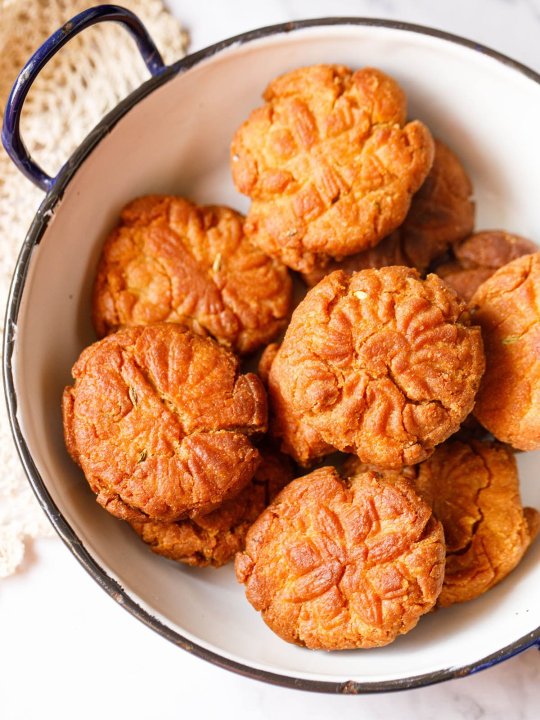
Thekua
49 notes
·
View notes
Text
"Savoring sweet moments with a plate of Jaggery Rice🍚"
#jaggery#rice#brown rice#rice recipes#indianfoodvideos#indian recipes#indian food#indian dessert#delicious#tasty treat#tasty food#tasty#connecttofood#cooking#food#comfort food#foodie#foodgasm#food porn#food blog
2 notes
·
View notes
Text
About jaggery...
Okay so, random post: I love panela, also known as gur, jaggery and a million other names across both latin america and asia. Why is that? Well, there are multiple reasons, first of which is that it's fucking awesome.
Like, you're telling me that there's this pill paste thing that's made of fucking sugarcane juice, is sweet asf while not being as harmful to your health? Count me in! Plus, it's literally so good, you can make coffee with it, or the most banger hot chocolate you've ever had, or even fucking lemonade which tastes amazing!
There's also the process, it's literally just soakig, boiling, molding and then drying sugarcane! And nothing is lost in the process! The paste thingy is the jaggery itself, the remaining juices, also called melaza, is used as a sweetener that even people with diabetes can use cuz it's 100% natural and also animal supplement (yeah, you heard me right! Animal supplement!), and the sugarcane fiber goes into the furnace as fuel! Nothing is wasted!.
On top of that, it's a point of connection across continents, it's common in both latin america and some parts of asia! It's so cool that we had the same idea even being an ocean apart, and if it's something that the indias brought here or something, then that's just to show that it's become such a staple in the culture over here that it's ingrained in the very soul of the subcontinent! (Like, literally the two biggest producers and consumers of jaggery in the world are India and Colombia, an asian and a latin american country) It feels like we're connected, even across an ocean and half a continent, even across the centuries, millenia even, of history, we still have the same tastes.
Also, spice buddies! We grow spices and get colonized for it! We're practically cousins!
Sending good vibes to all my desi and latino mates wherever you are, we're all together in this to some degree
#420
6 notes
·
View notes
Text

Prawn Patia
2 Tbsp. vegetable oil
10 curry leaves
1 small onion, finely chopped (about 1 cup)
2 small green chilis (such as Thai bird) chopped fine
½ cup tomato purée
1 Tbsp. ginger garlic paste
1½ tsp. red chili powder (cayenne powder)
½ tsp. turmeric powder
1 tsp. cumin powder
½ tsp. granulated sugar or grated jaggery
1½ Tbsp. vinegar (preferably palm vinegar)
2 Tbsp. water
kosher salt
1 cup medium shelled, deveined shrimp
1 Tbsp. chopped cilantro leaves
Heat oil in a large skillet over medium-high heat until shimmering. Gently put in the curry leaves and step aside as they pop. Stir for 20 seconds. Add the chopped onions and stir until lightly browned, about 5 minutes. Add the green chilies and stir for another minute. Add the tomato puree and keep stirring until oil separates from the onion tomato mix, about 5 minutes. Add the ginger-garlic past, red chili, turmeric, and cumin, and keep stirring until mixture is fragrant, about 5 minutes, taking care to ensure the mixture doesn't stick to the bottom.
Add the sugar/grated jaggery, vinegar, and water and cook till the rawness of the tomato is gone, about 5 minutes. Season to taste with salt. Add the shrimp, stir and let cook for one minute. Remove from heat. Allow to continue cooking off heat, stirring occasionally, until shrimp are cooked through, about 4 minutes longer. Garnish with coriander and serve with white rice and daal.
#angelkin#food#dinner#dairy free#gluten free#pescatarian#curry leaf#vegetable#onion#pepper#tomato#ginger#garlic#cayenne pepper#turmeric#cumin#jaggery#vinegar#seafood#shrimp#cilantro#dragonkin#mountainkin#pantherkin#pheonixkin#winter
4 notes
·
View notes
Text
Benefits of Jaggery Tea
Jaggery tea, a traditional beverage made from natural sweetener jaggery, has been gaining popularity for its numerous health benefits. When compared to regular sugar, jaggery offers a range of advantages that make it a healthier alternative.
One of the key benefits of jaggery tea is its impact on blood sugar levels. Unlike refined sugar, which causes rapid spikes and crashes in blood glucose levels, jaggery has a lower glycemic index. This means that it is digested and absorbed more slowly by the body, resulting in a more gradujaggery tea is rich in essential minerals such as iron and magnesium. Iron plays a crucial role in maintaining healthy red blood cells and preventing anemia, while magnesium supports proper nerve function and helps regulate blood pressure.
Moreover, jaggery contains antioxidants that help combat free radicals in the body. These antioxidants can contribute to overall well-being by reducing oxidative stress and supporting a healthy immune system.
Another advantage of choosing jaggery over regular sugar is its natural sweetness combined with its distinct flavor profile. Jaggery imparts a unique caramel-like taste to beverages like tea, adding depth and complexity to each sip without the need for artificial additives or flavorings. You can try Jaggery tea https://foodiajaggerytea.com/ here.
In summary, opting for jaggery tea instead of sugar brings several health benefits to the table. From stabilizing blood sugar levels to providing essential minerals and antioxidants, this natural sweetener proves to be an excellent choice for those looking to enhance their well-being while enjoying their favorite be
2 notes
·
View notes
Text

Gulas Palm Jaggery Powder a perfect natural sweetener for your desserts everyday recipes
Use coupon NOV10 to avail 10% discount. Shopping links are in Bio.
#men#internationalmensday#theboys#MrGold#gulasjaggerypowder#gulas#naturalsweetner#SugarReplacement#jaggery
0 notes
Text
youtube
Jaggery: A Sweet Way to Lose Weight?
Is jaggery a secret weight loss weapon? In this video, we explore the potential benefits of jaggery for weight management. Discover how this natural sweetener can aid in digestion, control blood sugar levels, and keep you feeling full for longer.
jaggery weight loss, jaggery benefits, blood sugar control, digestion, natural sweetener, healthy diet, weight loss tips
#fitness#healthy weight loss#weight loss tips#weight loss#summer weight loss#weight loss diet#weight loss motivation#health and wellness#healthy lifestyle#youtube#jaggery#jaggery benefits
1 note
·
View note
Text

Homemade Munthiri Kothu-Green Moong Jaggery Delight | Tocco
Indulge in the delightful fusion of green moong and jaggery with our Munthiri Kothu also called as Sweet paniyaram. Discover this traditional South Indian delicacy, perfect for any occasion.
#paniyaram#homemade snacks#munthiri kothu#green moong#jaggery#healthy eating#evening snacks#indian snacks#traditional snacks
0 notes
Text
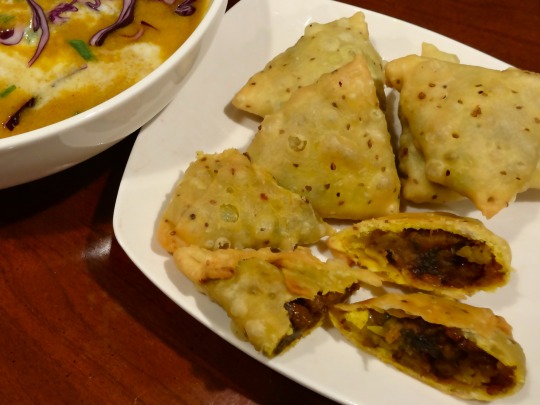
[ID: Several small, triangular samosas piled on a plate. Their skins are studded with small brown seeds. Two of the samosas are cut open to show their deep brown filling. End ID.]
Samusa / စမူဆာ (Burmese samosas)
Burmese samusa are smaller than Indian samosas, and their fillings tend to have a different spice profile. This recipe for potato samusa features a filling flavored with turmeric and black mustard seed and made richly sweet with the addition of jaggery—a tamarind dipping sauce adds tartness, saltiness, and umami. Leftover samusa are also excellent in samusa thouk—a brightly savory soup commonly made with split chickpeas and tamarind.
Recipe under the cut!
Patreon | Tip jar
Makes 8.
INGREDIENTS:
For the dough:
1/2 cup (60g) all-purpose flour
1/4 tsp salt
1/2 tsp carom seeds (ajwain)
1 Tbsp vegetable oil
About 2 Tbsp water
For the filling:
1 1/3 cup minced potato (1 large, 160g)--or boiled and mashed
1/2 small yellow onion, minced (2 Tbsp)
1 large jalapeño, minced (2 Tbsp)
15 mint leaves, minced
2 1/2 tsp turmeric
2 tsp ground Kashmiri chili (mirchi), or to taste*
2-4 tsp jaggery or brown sugar
1 1/2 tsp carom seeds (ajwain), toasted and ground
3/4 tsp brown mustard seeds (rai), toasted and ground
1 tsp cornstarch (optional)**
2 Tbsp neutral oil
*Mirchi consists of dried ground red chili peppers and is different from chili powder, which contains additional spices. If you don't have any, you may use another type of ground red chiil (prik bon, gochugaru, cayenne pepper) or grind dried red chilis yourself in a spice grinder or mortar and pestle.
**The cornstarch helps the filling stay compact and non-soggy. I have, however, omitted it before without anything terrible happening.
For the dipping sauce:
2 Tbsp tamarind paste*
1 Tbsp vegan fish sauce (such as Au Lac)**
1 Tbsp soy sauce
1 Tbsp jaggery or brown sugar
1/2" chunk (5g) ginger, grated
2 cloves garlic, grated
3-4 Thai bird's eye chili peppers, minced
*You may also use tamarind pulp, soaked in warm water for about 20 minutes and then mashed into a paste.
**Fish sauce tastes fermented and salty, not necessarily like fish. If you don't have a vegetarian fish sauce imitation on hand, you may use any fermented soybean product (fermented bean curd, doenjang, miso paste, light soy sauce) plus 1/4 tsp of salt.
To fry:
Several cups of a neutral oil
INSTRUCTIONS:
For the dough:
1. If measuring by weight, spoon flour gently into a dry measuring cup and then level off. In a small mixing bowl, add all dough ingredients except water and mix until well-combined.
2. Add water 1/2 Tbsp at a time until a smooth, slightly tacky dough forms. It should not crumble or form lines at the edges when formed into a ball and pressed flat.
3. Allow dough to rest for 20 minutes while you prepare the filling.
For the filling:
1. If using whole spices, toast carom and mustard seeds in a dry skillet over medium heat for a few minutes until fragrant. Grind using a spice grinder or mortar and pestle.
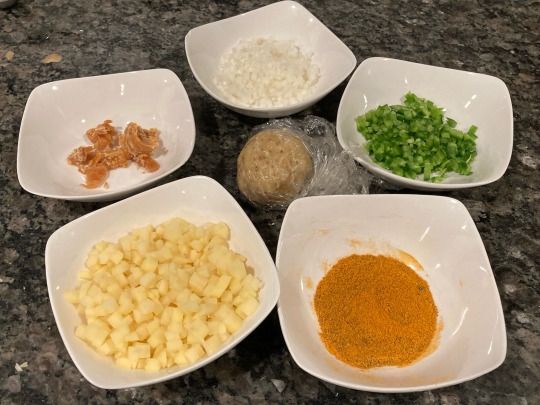
2. Heat 2 Tbsp of a neutral oil on medium in a skillet. Add onion and fry for a few minutes until translucent.
3. Add ground spices (carom seeds, mustard seeds, turmeric, chili) and allow to bloom in the oil for 30 seconds.
4. Add jalapeño and fry for a minute or two.
5. Add minced potato and salt and fry on low until tender. If potatoes are still not tender and seem dry, add a teaspoon of water and cover to steam until they are soft. (If you are using mashed potato, just add it to the pan.)
6. Add mint and jaggery and cook, stirring constantly, until jaggery dissolves. Set aside and stir in cornstarch.
For the dipping sauce:
1. In a small bowl, whisk all ingredients together.
To assemble:
1. Divide your dough into four equal sections (each of mine weighed about 24 grams)--each of these will make four samusa. Divide the filling into eight equal portions. Take one ball and cover the dough that you are not working with.
2. On a lightly floured surface, roll out the ball of dough into a circle about 6" (15cm) in width, or about as large as you can make it--the dough should be translucent in places. You can do this by rolling out from the center to the edge, then rotating the rolling pin and repeating the motion, until you have gone all the way around the circle.
The carom seeds may form small holes around themselves as you roll out the dough--this is normal and these will close again as you shape the samusa.
3. Using a sharp knife, cut the dough circle in half. Set one half aside and cover it to avoid drying out. Place one portion of filling in the center of your piece of dough. Optionally, wet the edges of the dough to make sealing easier.
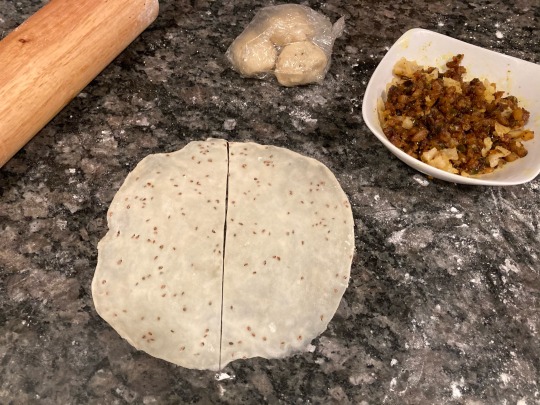
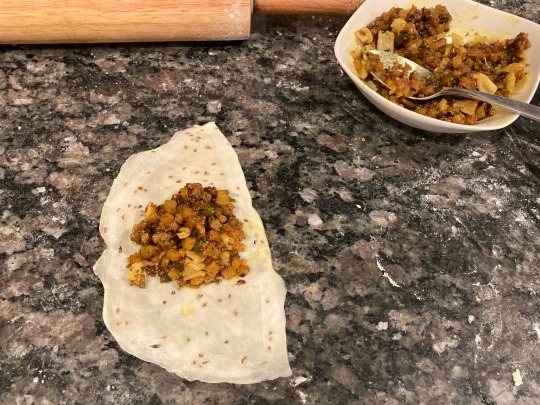
4. Fold one of the triangular sides of your piece of dough (in my pictures, this is the one at the top) over the filling. Repeat on the other side, overlapping the first piece of dough slightly, to cover the filling and create a triangular point on the bottom edge (on the left, in my picture). Press to seal.
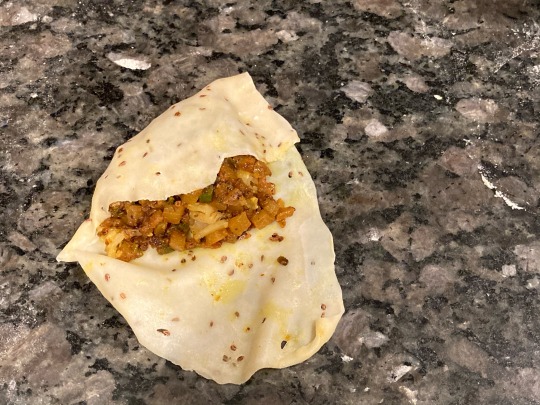

5. Fold the still-open edge back over the samusa to seal in the filling completely and create a triangular shape.
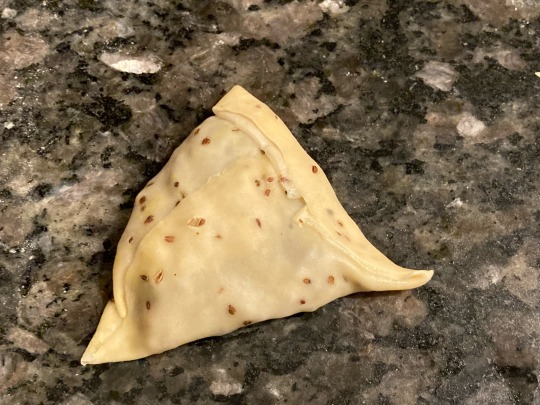
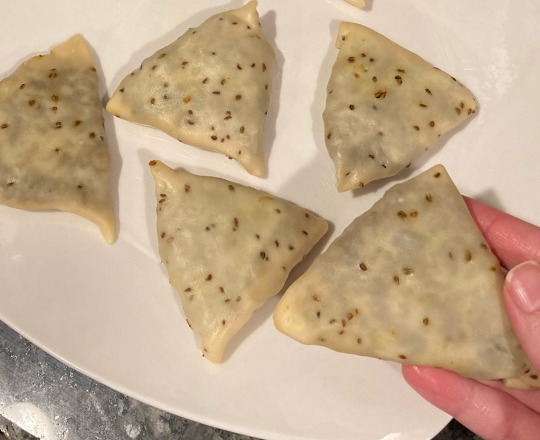
If you are inexperienced with rolling out dough, you may not be able to get the dough thin enough to fold over a whole portion of filling--if so, just reduce the amount of filling in each samusa. If you're not confident that your samusa are fully sealed, you may (instead of deep-frying) pan-fry them in 1/2" (1 cm) of neutral oil, turning once, until both sides are golden brown.
To fry:
1. Fill a small pot with a few inches of oil and heat it to 350 °F (175 °C). A piece of bread dropped into the oil should slowly begin to form bubbles--if it browns and floats immediately, your oil is too hot.
2. Using a slotted spoon, gently lower samusa into the oil. Depending on the size of your pot, you may need to do this in batches--try not to cover more than half of the surface area of the oil, to avoid temperature fluctuations.
3. Fry, flipping occasionally, until golden brown on all sides. Set aside on a wire cooling rack or a paper-towel-lined plate.
4. Optionally, to produce very crispy samusa, fry them again at 370 °F (188 °C). If you want to save some of the samusa to eat later, fry them once and freeze; immediately before serving, fry again.
Serve immediately with dipping sauce. Leftover samusa are sometimes eaten with samusa soup.
45 notes
·
View notes
Text
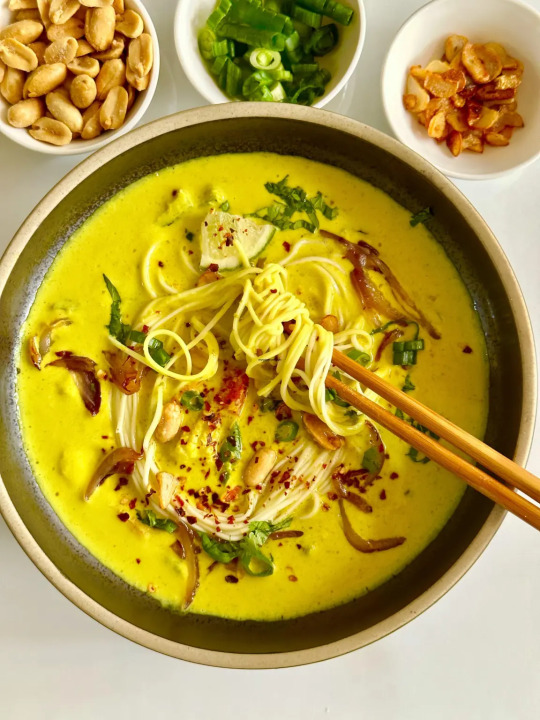
Vegan Burmese Khao Suey
#vegan#lunch#dinner#burmese cuisine#southeast asian cuisine#noodle bowl#curries#khao suey#lemongrass#carrots#baby corn#green beans#bell peppers#turmeric#garlic#ginger#chili#cilantro#coconut milk#olive oil#curry leaves#lime#jaggery#peanuts#lemon#noodles#💛
132 notes
·
View notes
Text
Jaggery vs. Honey: Which is Healthier
When it comes to sweetening our food, two popular choices are jaggery and honey. But which one is healthier? Let’s find out.
Jaggery is an unrefined sweetener derived from the sap of sugarcane or palm trees. It has a brown colour and a rich, caramel-like taste. Jaggery is not just sweet; it’s also packed with minerals like iron and magnesium. These minerals can help our bodies feel strong and energized. Some people say that eating jaggery can help with digestion and even keep our blood healthy.
In contrast, honey is produced by bees using the nectar collected from blossoms. It’s golden, sticky, and has a deliciously sweet taste. Honey is not only tasty but also has natural healing properties. It can soothe a sore throat and helps with coughs. Like jaggery, honey is full of antioxidants, which are good for keeping our bodies healthy. Plus, honey gives us a quick energy boost, making it a favourite for athletes.
So, which is better? It really depends on what you need! If you want more minerals and a deep flavour, jaggery might be the way to go. But if you prefer a liquid sweetener with healing benefits, honey could be your choice.
Both jaggery block and honey can be healthy options if used in moderation. Instead of refined sugar, try adding jaggery to your smoothies or drizzling honey on your yogurt. They can make your meals not only sweeter but also healthier!
In the end, whether you choose jaggery cubes or honey, you’re making a great choice for a natural sweetener. Enjoy experimenting with both in your favourite recipes.

0 notes
Text
Gudd ki chai☕Jaggery Tea
#chai#tea#tea time#chai time#chai tea#jaggery#jaggery tea#drinks#beverage#food and drink#food#cooking#delicious#jamshedpur#tasty#tasty recipes#2024#hot drink
2 notes
·
View notes
Text

Palm candy, Natural sweetener, Panakarkandu – Kodai buy
Buy palm candy: https://shorturl.at/sMGon
Kodai buy Website: https://shorturl.at/vM6V7
Follow our Facebook Page for organic related Products and more offers - https://shorturl.at/jjGRb
#kodaibuy#palmcandy#panakarkandu#jaggery#naattusakarai#countrysugar#traditionalsweetener#karupattivellm#karuppatticandy
0 notes
Text
youtube
#dryfruit#driedfruit#nuts#curd#freshfruits#indiandessert#chiaseeds#jaggery#namkeen#walnuts#ladoorecipe#coconut#dryfruitslover#dryfruitsladdoo#coconutladdu#foodforbrain#foodforeyes#healthyrecipes#healthyfood#healthyliving#sweetslover#cookingtiktok#cookingtok#foodtok#foodtiktok#foodvideos#foodlover#foodiegirl#foodie#foodietokph
0 notes